|
 Secure Site
Secure Site
|
 |
Archive for the 'Bamboo Chime Clocks' Category
 Iris Bath by Utagawa Toyohara, Ukiyo-e Print
Compassion is that which makes the heart of the good move at the pain of others. It crushes and destroys the pain of others; thus, it is called compassion. It is called compassion because it shelters and embraces the distressed.
– The Buddha.
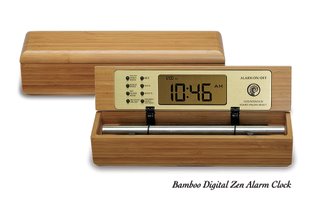 Bamboo Digital Chime Clock, a meditation timer and alarm clock Now & Zen
1638 Pearl Street
Boulder, CO 80302
Posted in Bamboo Chime Clocks, Japanese Inspired Zen Clocks, Meditation Tools, mindfulness practice, Now & Zen Alarm Clocks, Progressive Awakening, Well-being
 The famous moss garden of Saihō-ji. Saihō-ji is a Rinzai Zen Buddhist temple located in Matsuo, Nishikyō Ward, Kyoto, Japan. The temple, which is famed for its moss garden, is commonly referred to as “Koke-dera”, meaning “moss temple”, and is also known as “Kōinzan Saihō-ji”.
The famous moss garden of Saihō-ji is situated in the eastern temple grounds. Located in a grove, the garden is arranged as a circular promenade centered around Golden Pond. The pond is shaped like the Chinese character for “heart” or “mind” and contains three small islands: Asahi Island, Yūhi Island, and Kiri Island. The area around the pond is said to be covered with more than 120 varieties of moss, believed to have started growing after the flooding of the temple grounds in the Edo Period (1603 to 1868).
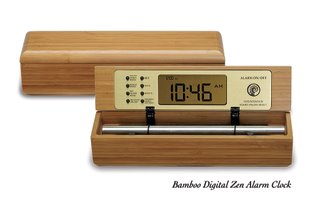 Bamboo Zen Chime Clocks & Timers adapted from wikipedia.org
Now & Zen
1638 Pearl Street
Boulder, CO 80302
Posted in Bamboo Chime Clocks, Chime Alarm Clocks, Japanese Inspired Zen Clocks, Meditation Timers, Meditation Tools, Now & Zen Alarm Clocks, Progressive Awakening, Yoga Timer, Yoga Timers by Now & Zen
 Utamaro - Wake up with gradual, beautiful acoustic chimes. The Zen Alarm Clock transforms your mornings and gets you started right, with a progressive awakening Waking up in the morning is a metaphor for life — a kind of daily microcosmic reenactment of our overall purpose for being in the world. That is, just about every religious tradition emphasizes spiritual growth. And the connection between “awakening” and spiritual growth can be found in practically all forms of spiritual teaching.
So if waking up in the morning really is a metaphor for our larger spiritual lives, this perspective might help us treat our morning ritual of getting out of bed as a kind of spiritual practice. Indeed, when approached in this way, how we wake up in the morning can make a larger difference in our lives overall.
Perhaps this is stretching the matter, but there are many people who do recognize that something as simple as waking up in the morning can be an authentic form of spiritual practice. For those who don’t have to go to work or get the kids to school, waking up naturally, whenever their body feels like it, can be a wonderful version of this practice. Waking up without an alarm, whenever your body has had enough rest, is probably the healthiest option, and the one that will leave us feeling most refreshed and ready to start the day. However, there are few of us that have this luxury, especially during the week.
 Wake up refreshed, love your alarm clock, transform your mornings with The Zen Alarm Clock's progressive awakening with gentle chimes.
Fortunately, for those who want to wake up right, without being startled awake by an annoying alarm or some radio DJ, there is The Zen Alarm Clock. This clock was designed to make waking up a kind of spiritual practice. The Zen Clock wakes users with a built-in 10 minute gradual progression of acoustic chimes. And this gradual form of “progressive awakening” has been thoughtfully designed to include esoteric features that are fitting for a form of spiritual practice. For example, not only is the hardwood Zen Alarm Clock beautiful to see and hear, the clock’s chime is tuned to produce the same frequencies as the tuning forks used by musical therapists in their healing work. Moreover, the Zen Clock’s pre-programmed 10 minute chime progression sequence advances according to the “golden ratio,” which reflects both the natural proportions of our own bodies and the patterns of growth used in the overall evolution of the universe. Even those who care little about such esoteric details nevertheless report that they love waking up with the gentle chimes of a Zen Alarm Clock. And as the makers of the Zen Alarm Clock hope, we may eventually come to see many of the simple details of our lives as forms of authentic spiritual practice.
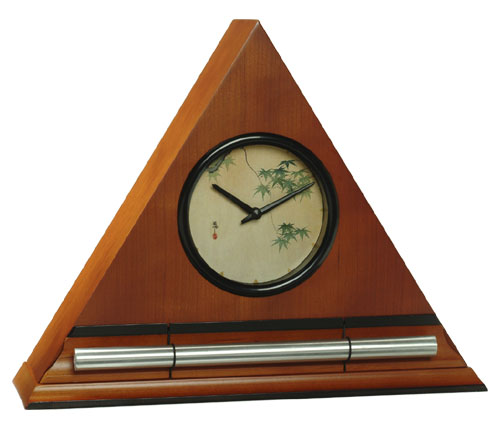 The Zen Alarm Clock transforms mornings, awakening you gradually with a series of gentle acoustic chimes Once you use a Zen Clock nothing else will do
Now & Zen – The Most Soothing Chime Alarm Clock Headquarter Store
1638 Pearl Street
Boulder, CO 80302
(800) 779-6383
orders@now-zen.com
Posted in Bamboo Chime Clocks
 Sharaku Toshusai, The actor Matsumoto Yonesaburo as Shinobu - Stay Calm, Be Thankful Write a gratitude list. If your average day feels more like a triathlon, saying a quick thanks can help you stay calm. According to a study in the journal Integrative Physiological and Behavioral Science, people who were coached to be more appreciative experienced a 23 percent drop in their levels of the stress hormone cortisol after a month. Before you tackle your to-do list, take a moment to jot down one thing you’re grateful for today.
Try Meditating More Often:
Although meditation can be done in almost any context, practitioners usually employ a quiet, tranquil space, a meditation cushion or bench, and some kind of timing device to time the meditation session. Ideally, the more these accoutrements can be integrated the better. Thus, it is conducive to a satisfying meditation practice to have a timer or clock that is tranquil and beautiful.
Using a kitchen timer or beeper watch is less than ideal. And it was with these considerations in mind that we designed our digital Zen Alarm Clock and practice timer. This unique “Zen Clock” features a long-resonating acoustic chime that brings the meditation session to a gradual close, preserving the environment of stillness while also acting as an effective time signal.
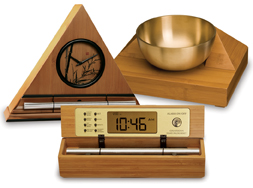 Time Your Meditation with a Gentle Bowl/Gong Timer from Now & Zen, Inc. Now & Zen’s Meditation Timer Store
1638 Pearl Street
Boulder, CO 80302
(800) 779-6383
Posted in Bamboo Chime Clocks, Chime Alarm Clocks, Meditation Timers, Meditation Tools, mindfulness practice, Well-being
 Yoshitoshi, Geisha at a Flower Festival, 1880 - Snooze More Soundly Unplug in the evening. According to a National Sleep Foundation (NSF) survey, 95 percent of people use an electronic device, such as a computer, just before bedtime. “But that can cause you to toss and turn,” says Russell Rosenberg, Ph.D., NSF chairman and director of the Atlanta School of Sleep Medicine. “The bright light from the screen delays the release of melatonin, a sleep-promoting hormone.” To snooze more soundly, switch off technology and try dimming the lights an hour before you aim to sleep.
 Snooze More Soundly Our Digital Zen Clock’s long-resonating Tibetan bell-like chime makes waking up a beautiful experience – its progressive chimes begin your day with grace. When the clock’s alarm is triggered, the acoustic chime bar is struck just once … 3-1/2 minutes later it strikes again … chime strikes become more frequent over 10 minutes … eventually striking every 5 seconds until shut off. As they become more frequent, the gentle chimes will always wake you up – your body really doesn’t need to be awakened harshly, with a Zen Clock you’re awakened more gradually and thus more naturally.
Unlike artificial recorded sounds coming out of a tiny speaker in a plastic box, natural acoustic sounds transform your bedroom or office environment.
The Digital Zen Clock also serves as a countdown and interval timer for yoga, meditation, bodywork, etc.; and it can also be set to chime on the hour as a tool for “mindfulness.”
Digital Zen Clocks feature a “high” and “low” chime strike volume control, which allows you to adjust the sound of the chime to suit your needs. The Digital Zen Clock runs on 2 AA batteries (not included) and can also be plugged in with the included AC jack. The clock includes a lighted digital display (which can be set to be lit full-time when plugged in).
 Gentle Chime Alarm Clocks for a Progressive Awakening Now & Zen’s Gentle Chime Alarm Clock Store
1638 Pearl Street
Boulder, CO 80302
(800) 779-6383
Posted in Bamboo Chime Clocks, sleep, Sleep Habits, Well-being
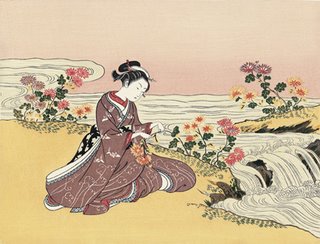 How Do We Find Balance in Life - Harunobu Suzuki, A girl Collecting Chrysanthemum Dem by the Stream The art of life balance requires creativity. If you push too hard you will miss its subtle rewards. Navigating easily through life requires a sense of curiosity and playfulness, like that of a child. This doesn’t excuse you from taking life seriously, simply that you release the illusion that you can control everything. By exerting control over everything, you may end up limiting yourself. The art of life balance requires dedicated time for having fun and observing the world around you. You may be surprised at what you find if you do.
 Meditation - A Stillness Practice Try a Stillness Practice Like Meditating:
Meditation is generally an inwardly oriented, personal practice, which individuals do by themselves. Meditation may involve invoking or cultivating a feeling or internal state, such as compassion, or attending to a specific focal point. The term can refer to the state itself, as well as to practices or techniques employed to cultivate the state. There are dozens of specific styles of meditation practice; the word meditation may carry different meanings in different contexts. Meditation has been practiced since antiquity as a component of numerous religious traditions. A 2007 study by the U.S. government found that nearly 9.4% of U.S. adults (over 20 million) had practiced meditation within the past 12 months, up from 7.6% (more than 15 million people) in 2002.
Although meditation can be done in almost any context, practitioners usually employ a quiet, tranquil space, a meditation cushion or bench, and some kind of timing device to time the meditation session. Ideally, the more these accoutrements can be integrated the better. Thus, it is conducive to a satisfying meditation practice to have a timer or clock that is tranquil and beautiful. Using a kitchen timer or beeper watch is less than ideal. And it was with these considerations in mind that we designed our digital Zen Alarm Clock and practice timer. This unique “Zen Clock” features a long-resonating acoustic chime that brings the meditation session to a gradual close, preserving the environment of stillness while also acting as an effective time signal. The Digital Zen Clock can be programmed to chime at the end of the meditation session or periodically throughout the session as a kind of sonic yantra. The beauty and functionality of the Zen Clock/Timer makes it a meditation tool that can actually help you “make time” for meditation in your life.
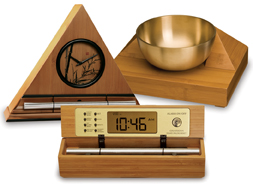 Timers for Meditation and Yoga - Progressive Acoustic Chimes
Now & Zen’s Meditation Timer Store
1638 Pearl Street
Boulder, CO 80302
(800) 779-6383
Posted in Bamboo Chime Clocks, wake up alarm clock, Well-being, Yoga Timer, Yoga Timers by Now & Zen
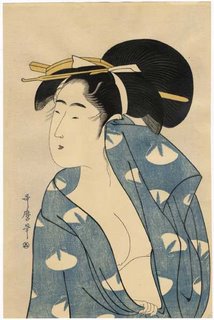 Use Your Yoga Timer to Cure a Headache Got a pounding headache? This sequence of supported poses can send it packing.
When a boa constrictor of stress creeps up your shoulders, circles your neck, and encases your skull, you may be more tempted to reach for the jaws of life than your yoga mat. But don’t underestimate the power of asana to unlock the vise grip of a tension headache; try this sequence of forward bends and reclining poses. The idea, says Northern California yoga teacher Richard Rosen, is to soothe the pulsating brain with internally focused forward bends. At the same time, by supporting the head, you’re giving the back of the neck permission to release. “When you get a tension headache, often the third eye at the place where the skull meets the neck is squeezed shut,” he says. Open that eye wide by letting the nape of your neck drift down toward your shoulders and imagining the base of your skull floating up toward your crown.
- Balasana (Child’s Pose) with head on bolster or block
- Janu Sirsasana (Head-to-Knee Pose) with head supported
- Downward-Facing Dog Pose (Adho Mukha Svanasana) with head on block
- Uttanasana (Standing Forward Bend) with head on padded chair, block, or other support
- Supta Baddha Konasana (Reclining Bound Angle Pose)
- Setu Bandha Sarvangasana (Bridge Pose) with block
- Viparita Karani (Legs-up-the-Wall Pose)
- Savasana (Corpse Pose)
Although meditation & yoga can be done in almost any context, practitioners usually employ a quiet, tranquil space, a meditation cushion or bench, and some kind of timing device to time the meditation session. Ideally, the more these accoutrements can be integrated the better. Thus, it is conducive to a satisfying meditation practice to have a timer or clock that is tranquil and beautiful. Using a kitchen timer or beeper watch is less than ideal. And it was with these considerations in mind that we designed our digital Zen Alarm Clock and practice timer. This unique “Zen Clock” features a long-resonating acoustic chime that brings the meditation session to a gradual close, preserving the environment of stillness while also acting as an effective time signal. The Digital Zen Clock can be programmed to chime at the end of the meditation session or periodically throughout the session as a kind of sonic yantra. The beauty and functionality of the Zen Clock/Timer makes it a meditation tool that can actually help you “make time” for meditation in your life.
adapted from YogaJournal.com by Catherine Guthrie
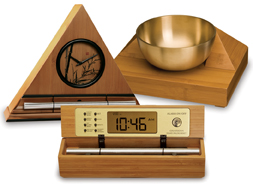 Yoga & Meditation Timers from Now & Zen, Inc. Now & Zen’s Yoga & Meditation Timer Store
1638 Pearl Street
Boulder, CO 80302
(800) 779-6383
Posted in Bamboo Chime Clocks
 KOITSU -- Full Moon at Akashi Beach - Choose an Alternative to a Snooze Button Alarm Clock Kick your insomnia for good by creating a simple and restful nighttime routine.
Whether it’s yoga to reduce muscle tension, breathing to slow the heart rate, or an herbal massage to calm a racing mind, a simple routine can be the most effective and safest road to a better night’s sleep. There is growing evidence that small behavioral changes can make a big difference in getting some good shuteye. A 2006 study published in the Journal of the American Medical Association showed that participants who made modifications like reducing stimuli in the bedroom and learning relaxation techniques improved their sleep more than those who took drugs.
The first step to feeling well rested is to institute a regular bedtime. Maintaining consistency will help keep your circadian rhythms—the biological changes that happen every 24 hours—steady. Eventually, your body will naturally understand and crave sleep during these hours.
The next step is to create some space between your busy day and sleep time. “You can’t just work until 9 at night, and then stick your head on the pillow and fall asleep,” Khalsa says. So turn off the television, computer, and radio. Cut down on or eliminate evening classes and exercise that leaves you feeling amped up. When you come home, honor this transition by playing relaxing music, lighting candles, or putting on your favorite pajamas. Think of the yoga precept ofpratyahara: Withdraw your senses in order to turn inward.
Once you’ve chosen your specific nighttime ritual, repeat it every night to cue your body that it’s time for sleep. Khalsa says that after a few weeks of practice, your sleep will improve. “These things don’t work instantly, but over time you normalize arousal and sleep starts to get better.” And as opposed to suffering from side effects such as headaches, dizziness, daytime drowsiness, and long-term dependence on drugs, you’ll feel better overall, instead of worse, with your nighttime routine. “It improves individuals on a holistic level, and other problems that they might have had also might start to dissipate,” says Khalsa. Now that sounds like a side effect we can all live with.
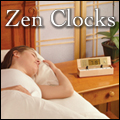 Chime Alarm Clocks for a Progressive, Peaceful Awakening Waking up in the morning should be as pleasant as falling asleep at night. The Zen Alarm Clock’s gradual, gentle awakening is transformative.
Boulder, Colorado—an innovative company has taken one of life’s most unpleasant experiences (being startled awake by your alarm clock early Monday morning), and transformed it into something to actually look forward to. “The Zen Alarm Clock,” uses soothing acoustic chimes that awaken users gently and gradually, making waking up a real pleasure. Rather than an artificial recorded sound played through a speaker, the Zen Clock features an alloy chime bar similar to a wind chime. When the clock’s alarm is triggered, its chime produces a long-resonating, beautiful acoustic tone reminiscent of a temple gong. Then, as the ring tone gradually fades away, the clock remains silent until it automatically strikes again three minutes later. The frequency of the chime strikes gradually increase over ten-minutes, eventually striking every five seconds, so they are guaranteed to wake up even the heaviest sleeper. This gentle, ten-minute “progressive awakening” leaves users feeling less groggy, and even helps with dream recall.
adapted from Yoga Journal by Nora Isaacs
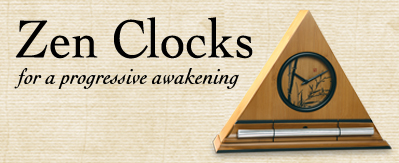 Zen Clocks for a Progressive Awakening Now & Zen’s Chime Alarm Clock Store
1638 Pearl Street
Boulder, CO 80302
(800) 779-6383
Posted in Bamboo Chime Clocks, Natural Awakening, sleep, Sleep Habits
 Why Do Some People Need More Sleep? New research suggests it is in our genes…
Some people are genetically programmed to need less sleep than the rest of us, according to a new paper published this week in Science. A rare genetic mutation lets its carriers function happily and healthily even with hours less sleep each night than doctors normally recommend.
Researchers discovered the enviable gene variant after studying a family in which two members, a mother and a daughter, seemed to need much less daily rest than their close relatives. The women slept just 6.25 hours per night, while others in the family averaged 8.06 hours. The researchers then sequenced some genes they thought could be responsible, and discovered that both mom and daughter — unlike others in the family — had a never-before-seen mutation in a gene that’s known to affect circadian rhythms.
Next, to test whether that gene variant was really the cause of mom and daughter’s shortened sleep time (and not just some freak coincidence), the researchers genetically engineered a group of mice to express the newly found mutation. Sure enough, those mice had a typical activity period that’s more than an hour longer, on average, than that of a normal mice. The mutant mice also seemed to need less catch-up sleep than others after a period of sleep deprivation.
The new findings give a fascinating insight into why humans vary so much in how long we sleep — with a good night’s shut-eye ranging anywhere from six hours to nine, depending on whom you ask. But the result can hardly explain everything. This new-found gene variant appears in just 1 in 60 families that were studied, according to a follow-up paper that’s also published this week in Science. For genes to explain the full range of human sleep needs, then, there would have to be other genes involved too.
adapted from Time.com, by Laura Blue
Our Digital Zen Clock’s long-resonating Tibetan bell-like chime makes waking up a beautiful experience – its progressive chimes begin your day with grace. When the clock’s alarm is triggered, the acoustic chime bar is struck just once … 3-1/2 minutes later it strikes again … chime strikes become more frequent over 10 minutes … eventually striking every 5 seconds until shut off. As they become more frequent, the gentle chimes will always wake you up – your body really doesn’t need to be awakened harshly, with a Zen Clock you’re awakened more gradually and thus more naturally. Unlike artificial recorded sounds coming out of a tiny speaker in a plastic box, natural acoustic sounds transform your bedroom or office environment.
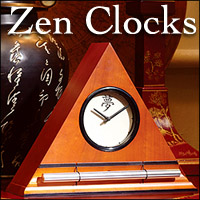 The Zen Alarm Clock transforms mornings, awakening you gradually with a series of gentle acoustic chimes Once you use a Zen Clock nothing else will do. Now & Zen – The Zen Alarm Clock Store
1638 Pearl Street
Boulder, CO 80302
(800) 779-6383
Posted in Bamboo Chime Clocks, Chime Alarm Clocks, sleep, Sleep Habits, Well-being
 Scientific Evidence for Beauty Sleep - Elegant Women. Courtesy of the Japan Ukiyo-e Museum Beauty sleep, it’s widely assumed, is one of those invented phenomena that parents use to ease their children’s passage to bedtime. After all, if sleeping had any real impact on beauty, bears, toads and frogs would be the handsomest creatures on the planet. But now a new study out of Sweden suggests there may be something to it after all.
In the study, published Tuesday on BMJ.com, John Axelsson of the Karolinska Institute looked at the effect that sleep, or its lack, had on the way other people perceived the attractiveness of the sleeper.
Axelsson’s interest in the subject was partly inspired by a question from his young daughter about whether it was the long nap that made Sleeping Beauty so lovely. And, partly, it was that he saw a gap in the scholarship. “The field of sleep research is full of studies showing the physiological and cognitive consequences of disturbed sleep,” he says, “while there is clear lack of how poor sleep affects our everyday social life.”
It’s estimated that about 40 million people suffer from chronic sleep disorders in the U.S. and a further 20 million have frequent problems sleeping. Even for good sleepers, with holiday and New Year’s celebrations oncoming, this is among the most slumber-deprived of seasons.
 How Can You Get Your Beauty Sleep? For the study, 23 participants, all between the prime partying ages of 18 to 31, were recruited. They were asked to sit for photographs in the afternoon, between 2 p.m. and 3 p.m. This time “coincides with the afternoon dip, or siesta time, a time where most people are sleepier,” says Axelsson. And unlike office workers, the study volunteers were not allowed to consume a mid-afternoon caffeinated beverage to keep them going.
Each photograph was identical — lit the same way, the same distance from the camera, with no makeup and natural hairstyles. The subjects were told to have a relaxed, neutral expression. They weren’t allowed to drink alcohol for the 48 hours prior to the experiment. The only difference among the volunteers was that some had had a full night’s sleep the night before, while others had been awake for 31 hours straight, after just five hours of sleep the previous night.
The photos were then shown to a group of 65 different people, who, knowing nothing about how tired the people in the photos were, rated their attractiveness. The observers rated the sleep-deprived as less healthy looking, less fetching and, obviously, more tired-looking.
Of course, anyone who’s ever pulled an all-nighter knows that it’s no formula for good looks — the next day, you’re saddled with puffy, bloodshot eyes, dark circles and a wan complexion — but now there’s a study to prove it. So if the old adage about getting your beauty sleep is true, what does that mean for watched pots never boiling, or crying over spilled milk? Probably nothing, but Axelsson is curious. “There are so many old ‘sayings’ or beliefs incorporated in our culture, but we do not know if they are true,” he says. “It is our scientists’ responsibility to evaluate the truth in them.”
Boulder, Colorado—an innovative company has taken one of life’s most unpleasant experiences (being startled awake by your alarm clock early Monday morning), and transformed it into something to actually look forward to. “The Zen Alarm Clock,” uses soothing acoustic chimes that awaken users gently and gradually, making waking up a real pleasure.
What makes this gentle awakening experience so exquisite is the sound of the natural acoustic chime, which has been tuned to produce the same tones as the tuning forks used by musical therapists. According to the product’s inventor, Steve McIntosh, “once you experience this way of being gradually awakened with beautiful acoustic tones, no other alarm clock will ever do.”
adapted from Time.com by Belinda Luscombe
 Choose a Gentle Alarm Clock to Awaken You Gently Now & Zen – The Peaceful Awakening Clock Store
1638 Pearl Street
Boulder, CO 80302
(800) 779-6383
Posted in Bamboo Chime Clocks, sleep, Sleep Habits, wake up alarm clock
« Previous Page — « Previous Entries
Next Entries » — Next Page »
|
|
|
|